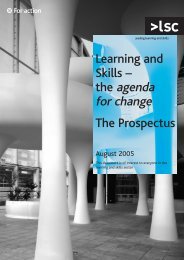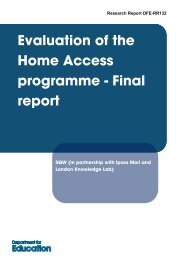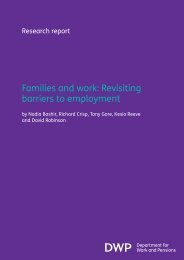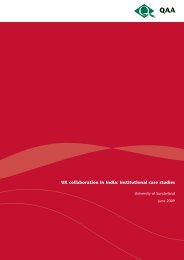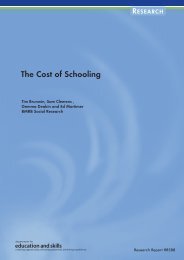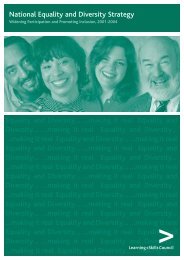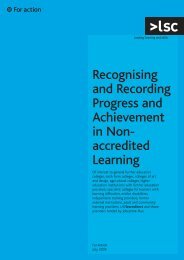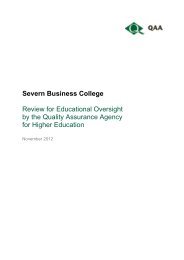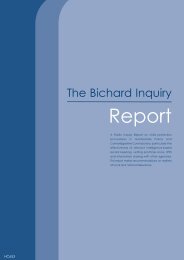Faiths and further education - Church of England
Faiths and further education - Church of England
Faiths and further education - Church of England
- No tags were found...
Create successful ePaper yourself
Turn your PDF publications into a flip-book with our unique Google optimized e-Paper software.
41The Policy Context133This short section cannot hope to summarise the policy context forthe whole FE sector. Further <strong>education</strong> <strong>of</strong>fers its students a widevariety <strong>of</strong> <strong>education</strong>al <strong>and</strong> training opportunities, underpinned by ageneral purpose to promote social inclusion.This section aims togive a brief bullet-point guide for the new chaplain. For <strong>further</strong>information, see the bibliography at Annex C.134The range <strong>of</strong> FE provision includes:• vocational provision for 16–19-year-old students• vocational courses for 14–16 year olds• GCSE <strong>and</strong> A-levels• higher <strong>education</strong> from foundation level to degree courses• adult <strong>and</strong> community learning (including leisure <strong>and</strong> health)• key skills training <strong>and</strong> learning technologies• Skills for Life (literacy, numeracy, ESOL <strong>and</strong> ICT).135The range <strong>of</strong> providers includes:• general FE colleges• sixth form colleges• other adult <strong>and</strong> community learning providers• work-based learning providers.136The range <strong>of</strong> stakeholders in <strong>further</strong> <strong>education</strong> includes:• the LSC• local LSCs• awarding bodies• sector skills councils• businesses <strong>and</strong> employers with an interest in post-14 <strong>education</strong><strong>and</strong> training• schools, schools with sixth forms <strong>and</strong> colleges• group training associations• HE institutions• inspectorates (HMIP,ALI <strong>and</strong> Ofsted)• learning partnerships• local <strong>education</strong> authorities• pr<strong>of</strong>essional <strong>and</strong> trade associations• trade unions• training providers• voluntary sector bodies• regional development agencies• the Sector Skills Development Agency (SSDA)• the National Institute <strong>of</strong> Adult Continuing Education (NIACE)• the Association <strong>of</strong> Colleges (AoC)• the Sixth Form Colleges Forum.137Of course, government departments are much involved in <strong>further</strong><strong>education</strong>, the DfES in particular, but also other departments withinterests in skills <strong>and</strong> economic development such as theDepartment <strong>of</strong> Trade <strong>and</strong> Industry, the Department for Work <strong>and</strong>Pensions <strong>and</strong> HM Treasury.138As in all sectors <strong>of</strong> English state-funded <strong>education</strong>, the Governmenthas made its intentions clear: to widen participation by all socialclasses, age groups, ethnic groups <strong>and</strong> from both genders. Suchwidening <strong>of</strong> participation has key performance points: recruitment,retention <strong>and</strong> achievement.139The most important governmental agency with directresponsibilities in this area is the LSC.140The LSC’s priorities for 2004/05 are to:• make learning truly dem<strong>and</strong>-led so that it better meets the needs<strong>of</strong> employers, young people <strong>and</strong> adults• ensure that all 14–19 year olds have access to high-quality,relevant learning opportunities• transform <strong>further</strong> <strong>education</strong> so that it attracts <strong>and</strong> stimulatesmore business investment in training <strong>and</strong> skills development• strengthen the role <strong>of</strong> the LSC in economic development so thatwe provide the skills needed to help all individuals into jobs• strengthen the LSC’s capacity to work effectively at a regionallevel – particularly with regional development agencies <strong>and</strong>regional skills partnerships• improve the skills <strong>of</strong> the workers who are delivering publicservices.141The LSC’s main tasks are to:• raise participation <strong>and</strong> achievement by young people• increase dem<strong>and</strong> for learning by adults• raise skills for national competitiveness• raise the quality <strong>of</strong> <strong>education</strong> <strong>and</strong> training delivery• equalise opportunities through better access to learning• improve effectiveness <strong>and</strong> efficiency.



